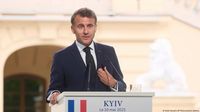French President Emmanuel Macron has voiced skepticism regarding Russian President Vladimir Putin's recent proposal for direct negotiations with Ukraine, labeling it as insufficient. This comment came on May 11, 2025, as reported by RIA Novosti. Putin had suggested that direct talks take place on May 15, 2025, in Istanbul without any preconditions. Macron, however, countered that negotiations should not precede an unconditional ceasefire, indicating that he perceives Putin's offer as a tactic to buy time rather than a genuine step towards peace.
In a related development, Macron announced during a press conference in Kyiv on May 10, that the United States would primarily oversee a proposed 30-day unconditional ceasefire in Ukraine. This announcement was made alongside German Chancellor Friedrich Merz and the leaders of the UK and Poland, Keir Starmer and Donald Tusk, respectively. Macron emphasized that all European nations would contribute to this effort, particularly if the ceasefire is violated. He stated, "If the ceasefire regime is violated, we agreed to prepare massive sanctions coordinated by Europeans and Americans," according to AFP.
Macron also reassured Ukraine of continued financial and military support, particularly in light of a potential pause in hostilities. He remarked, "We will continue working to ensure Ukraine has reliable security guarantees, with a sustainable army format and weaponry that will allow it to deter further attacks, with joint ventures with the West, financing, and adapted weapon formats." This commitment underscores the ongoing support from Western allies amidst the conflict.
Polish Prime Minister Donald Tusk echoed these sentiments, highlighting the unity among Western nations in their efforts to achieve a ceasefire in Ukraine. Tusk remarked, "For the first time in a long time, we have a sense that the whole free world is truly united," following discussions with Merz, Macron, Starmer, and Ukrainian President Volodymyr Zelensky.
In a noteworthy turn of events, Ukraine has indicated its willingness to engage in direct negotiations with Russia, contingent on Putin's agreement to a 30-day truce. This information was relayed by Axios, which noted that Zelensky communicated this during a phone conversation with former President Donald Trump and other leaders of the coalition. Sources indicated that Trump appeared satisfied with this development, and Washington is now awaiting a response from Russia.
Following the coalition meeting in Kyiv, Foreign Minister Andriy Sybiga announced that Ukraine and its allies are prepared for a full unconditional ceasefire on land, in the air, and at sea for at least 30 days, starting May 12, 2025. This coalition, known as the "coalition of the willing," includes approximately 30 nations, including Germany, the United Kingdom, and France. The meeting took place shortly after a large military parade in Moscow, attended by leaders from various countries, including Chinese President Xi Jinping and Serbian President Aleksandar Vucic.
On another front, on May 9, 2025, in Lviv, foreign ministers from several countries signed a declaration aimed at establishing a Special Tribunal for aggression against Ukraine. This initiative is expected to be followed by an official appeal from Ukraine's President to the Council of Europe, requesting the establishment of the tribunal. This appeal is anticipated to be presented to Council of Europe Secretary General Alain Berset during the Committee of Ministers meeting on May 13 and 14, 2025.
David Crane, the chief prosecutor of the UN Special Court for Sierra Leone, highlighted the importance of transparency in appointing key positions within this international mechanism. He noted, "Creating a tribunal outside the UN framework, the Council of Europe and its partners have taken a decisive step to emphasize the importance of state accountability for adhering to international law." This sentiment reflects growing international support for holding those responsible for aggression accountable.
The ongoing discussions surrounding the ceasefire and the potential for direct negotiations signal a critical juncture in the conflict. As both sides weigh their options, the international community remains vigilant, advocating for peace and stability in the region while preparing to respond to any violations of the ceasefire.
As the situation develops, the focus will remain on the responses from both Russia and Ukraine, as well as the actions of their respective allies. The world watches closely, hopeful for a resolution that may finally bring an end to the violence and suffering experienced in Ukraine.

